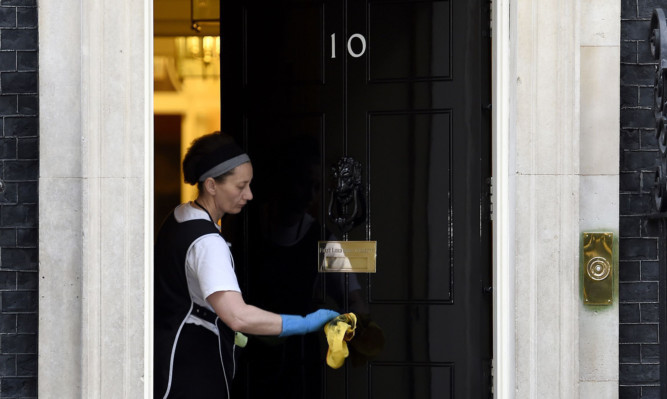One of the most closely-contested general elections for decades formally gets under way today, with David Cameron accusing Labour of planning a £3,000 tax hike for every working family.
The Prime Minister is expected to warn of a “stark choice” facing the country when he returns to Downing Street after a symbolic final audience of his term in office with the Queen.
His Conservative Party entered the first day of campaigning buoyed by an opinion poll giving it a four-point lead over Labour – its biggest advantage since September 2010.
But Labour insisted the Tories’ tax claim was “totally made up” as it prepared to launch an offensive over Mr Cameron’s promised in/out referendum on Britain’s membership of the EU.
Launching the Opposition’s business manifesto, leader Ed Miliband will say a Tory victory poses a “clear and present danger” to jobs and prosperity and make it a Labour commitment to “return Britain to a leadership role” in Brussels.
Prerogative to order the dissolution of Parliament no longer rests with the monarch, under new rules fixing each term at five years, but Mr Cameron will nevertheless make the short journey to Buckingham Palace to recommend she issue a proclamation summoning the new parliament on May 18.
Deputy Prime Minister Nick Clegg will follow Mr Cameron into the Palace for a separate private audience – as Lord President of the Privy Council he has an obligation to do so – before focusing on the NHS at a Midlands seat the Liberal Democrats are fighting to hold.
Parties have been sparring in earnest for months but every day from now until the eve of polling on May 7, leaders will be on a final push around the UK in the search for those crucial votes that could swing the result in their favour.
Ukip leader Nigel Farage – whose eurosceptic party is hoping to translate being the UK’s third party in opinion polls into an influential presence in the Commons in the likely event of another hung parliament – will set out its key election pledges.
With the majority of polls still showing the two established Westminster parties running neck-and-neck, increasingly bitter blows are being traded over the implications for public spending and tax in each of their deficit reduction plans.
Another poll over the weekend showed Labour in a four-point lead.
Mr Cameron – speaking before heading to the south-west of England for a campaign rally – will fuel the argument by unveiling Conservative calculations about potential tax rises if Labour returns to power.
It said that if the Opposition sought to balance the books with an equal mix of spending cuts and tax rises – an approach it claims Mr Miliband prefers on the basis of a 2010 magazine interview – it would mean every working household’s bill rising by £3,028 a year.
Mr Balls has ruled out raising national insurance, the main rate of VAT or the basic or higher rates of income tax, and Tories claim his promised restoration of the top 50p rate on £150,000-plus salaries would raise little.
“In 38 days’ time you face a stark choice: the next prime minister walking through that door will be me or Ed Milliband,” Mr Cameron will say.
“You can choose an economy that grows, that creates jobs, that generates the money to ensure a properly funded and improving NHS … and a government that will cut taxes for thirty million hard-working people.
“Or you can choose the economic chaos of Ed Miliband’s Britain – over £3,000 in higher taxes for every working family to pay for more welfare and out-of-control spending. Debt will rise and jobs will be lost as a result.
“Ed Miliband pays lip service to working people while planning to hike taxes and increase debt. After five years of effort and sacrifice, Britain is on the right track. This election is about moving forward – and as Prime Minister here at Number 10, that’s what I will deliver.”
Shadow chief secretary to the Treasury Chris Leslie said: “These are totally made up figures from a desperate David Cameron who has raised taxes on working people.
“Under the Tories families have lost over £1,100 a year on average from tax and benefit changes, while millionaires have been given a huge tax cut.
“Labour will reverse the Tory tax cut for millionaires and cut taxes for millions on middle and low incomes through a lower 10p starting rate of income tax.”
Labour yesterday urged the Tories to set out to voters where exactly the axe would fall in £12 billion of benefit cuts central to Chancellor George Osborne’s plan to restore the economy to an annual surplus by 2018/19.
The independent Institute for Fiscal Studies (IFS) warned that the planned cuts will be “really tough” to achieve, involving “pretty dramatic” reductions in areas such as housing and disability benefits over the next three years.
Work and Pensions Secretary Iain Duncan Smith said a quarter had already been publicly identified but the party may not think it “relevant” to explain where the rest of the cuts will fall before the election.
It came as Conservatives accused Labour of “letting the cat out of the bag” on plans to increase state borrowing, after election campaign vice-chairwoman Lucy Powell said the party “may use some investment borrowing”.
Unlike the Tories, who have committed to balancing the overall budget by 2017/18, Labour has promised only to eliminate the current deficit on day-to-day spending by the end of the next Parliament, leaving open the option of borrowing money to invest in capital projects.
